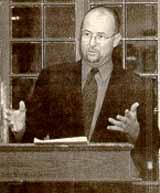'Esquire' chief recounts career
The Daily Pennsylvanian
November 6, 1998
-
'Esquire' chief recounts career
Photo by Kevin Falcone/The Daily Pennsylvanian
Though many people start on the path to success with humble beginnings, David Granger is perhaps the only one to go from Muppet to editor. In a speech Wednesday at the Kelly Writers House, Granger, the executive editor of Esquire magazine, outlined his career highs and lows - which included writing for Muppet Magazine under the byline of Rolf, the dog Muppet - to a diverse audience of faculty, students and alumni. Granger noted that the story of the men's magazine is filled with at least as many ups and downs as his own life. Esquire was at one of its low points when Granger left GQ magazine to become Esquire's editor in June 1997. Bringing his personal philosophies with him - as well as several GQ staff members - Granger promptly turned Esquire around, increasing circulation by five percent and advertising pages by 40 percent. Asked by an aspiring journalist for advice on entering the business, Granger recommended "getting any job, losing it quicky and then getting anotherjob." Indeed, Granger's first professional experience was writing book reviews for Muppet Magazine as Rolf. He lost the position after 18 months. Before landing at GQ, Granger worked at publications ranging from Sports Inc. to Ad Week.
At GQ, he started employing the ideas that would eventually get him the job at Esquire, such as actively seeking out stories. In a feature on handguns, for example, Granger and his staff envisioned a piece on how the weapon is used and who it affects. They then toured maximum security prisons looking for "articulate murderers" who could provide the actual story. "You have to believe in something and make it the foundation of your magazine," he said. "Never put anything in a magazine just to get press." After Esquire managers noticed the direction GQ took under Granger's philosophies, they offered him the magazine's executive editor position. Esquire, he said, was "the first magazine I read that I connected with." At the time, he explained, Esquire was down to its lowest advertising revenue in years and was facing disparaging criticism in papers like The New York Times. At the helm of Esquire, Granger stuck to his ideas and tried to "publish stories that make you feel something." In doing so, he let his writers "take incredible chances with the English language." One story, entitled "Old," so vividly described the fife of an elderly man that Granger recalled crying when he first saw it. Readers also responded emotionally, and soon advertising revenues were on the rise.
Harrison College House Dean Art Casciato asked Granger - a longtime friend of his - to give Wednesday's lecture, entitled "Saving a Magazine." "No one I've met cares as deeply about literature as David Granger," said Casciato, a former University of Miami English professor. Casciato hoped Granger's speech would inspire students with his enthusiasm and success story. College senior Caroline Babson, for one, said she "worked over the summer at a magazine, so it was really interesting to hear another perspective."

